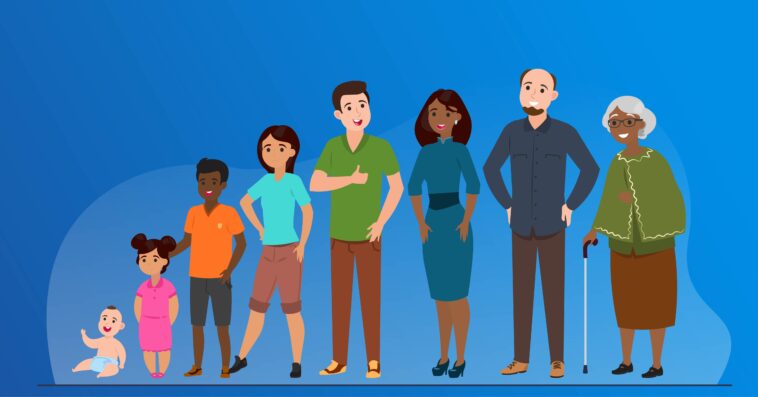What is human growth?
Simply said, growth is the unstoppable expansion of a physical entity over time. Our bodies develop normally as we age, without our having to make any special efforts in this regard. However, there are many different phases of human development and many different circumstances that might affect each of those phases.
The stages in human growth and development
Fetal stage: The initial stage of human development is the foetal stage, which takes place inside the uterus of the mother. A mother’s egg is fertilised by a father’s sperm, resulting in the development of an embryo. This embryo develops into a little human, or foetus, over time. The unborn child depends entirely on its mother and cannot function without her.
Infancy: A kid will spend about nine months developing inside its mother’s womb before it is born. Once the baby is born, it begins a new phase of development and is considered an infant until it reaches the age of one. The newborn is still highly reliant on its mother, but it is now able to breathe on its own and to communicate through crying when it is hungry, chilly, overheated, or uncomfortable in some other way. Babies are unable to communicate verbally.
Toddler: Once a newborn reaches its first birthday, it enters the toddler stage of development. It’s now old enough to go to kindergarten. Toddlers (1–3 years old), preschoolers (4–5 years old), and elementary school students (5–12 years old) make up the core years of childhood. A child’s development and acquisition of abilities, such as walking, talking, and eating independently, occur at a rapid pace. At this point, they also begin to develop a sense of autonomy and to learn how to express themselves through reading, writing, and verbal exchange. The ability to establish acquaintances and an increased awareness of one’s environment are other benefits.
Adolescence: Adolescence is the time period between the ages of 12 and 18. Children now enter the adolescent years. This is the time when a person begins to go through puberty. It occurs at different ages for different people, but usually between the ages of 13 and 19. Rapid physical development and profound interior alterations characterise the adolescent years. The body starts to take on a new silhouette, hair grows, and men’s voices get deeper. In addition, teenagers nowadays typically enjoy a high degree of autonomy.
Adulthood: When a person reaches the age of 20, they are considered an adult. There are three sub-groups within this age range: 20-36-year-old “young adults,” 36-55-year-old “middle-aged adults,” and 55-65-year-old “older adults.” At this point in development, people have the greatest freedom they’ve ever had. This is the age at which most people start having children of their own.
Elderly:Humans are considered elderly once they reach the age of 65. This phase lasts for however long it takes to die. This is the final phase of maturation for humans.
8 stages of psychological human growth and development
Stage 1 — Infancy: Trust
At this point, newborns begin to form attachments to their primary carers based on the level of care they receive. Infants who are cared for properly develop a sense of confidence in other people. Babies who aren’t properly cared for develop a lack of confidence in adults.
Stage 2 — Toddlerhood: Independence
The acts of main carers continue to have a significant impact on children’s development, as was the case in the preceding stage. Kids can learn to be self-reliant if given the chance to explore here. Children can’t learn to rely on themselves or feel confident in their talents if they’re not given the chance to do so.
Stage 3 — Preschool Years: Assertiveness
At this developmental juncture, kids start to assert themselves and express what they want. The reactions to their acts of self-expression and assertion will shape their maturation. If a youngster expresses their feelings about an incident, such as sadness, and they are validated, the child will learn that it is beneficial to take the initiative. However, if this behaviour is met with hostility, they may begin to feel bad about themselves for being so forceful. They may develop into adults with less self-assurance and assertiveness.
Stage 4 — Early School Years: Comparison
Children’s psychological growth and development is greatly facilitated after they begin formal education at stage 4. Nowadays, kids spend a lot of time with their peers, which might spark unhealthy comparisons. Children’s confidence and self-esteem can take a hit if they believe they are falling short of the standards set by their peers. The converse is true if kids have the impression that they are better than their peers.
Stage 5 — Adolescence: Identity
Humans go through a period of tremendous psychological upheaval known as adolescence. During adolescence, people work on discovering who they are and what they want out of life. At this stage of life, when they are still developing their sense of self, many adolescents experience an identity crisis.
Also Read: Yatharth Hospital IPO opens tomorrow: 10 things to know before you buy it
Stage 6 — Young Adulthood: Friendships and Isolation
Humans enter young adulthood at the age of about 20. At this point in life, people begin to establish lasting relationships with their peers. These ties might be platonic or romantic in nature. Those who do so with ease will reap the emotional benefits of their connections. However, there are negative consequences for those who struggle with this alone.
Stage 7 — Middle Adulthood: Purpose
Another form of identity crisis manifests itself throughout the mid-thirties. This time around, the crisis seems to centre on one’s value to society. At this point in life, a person’s sense of purpose is enhanced if they have a firm grasp on the ways in which they are making a positive impact on the world. They may also feel a sense of “generativity,”
Stage 8 — Late Adulthood: Reflection
People towards the end of their life often think back on their lives. If this introspection leads to a sense of accomplishment and contentment, they will be able to accept their own mortality with grace. On the other hand,





